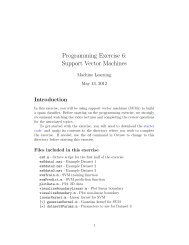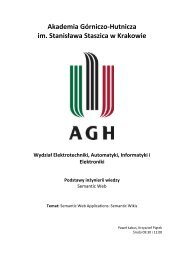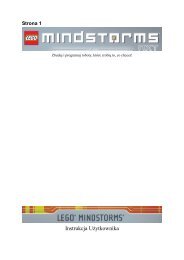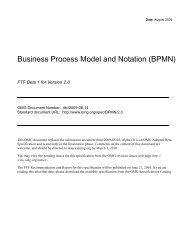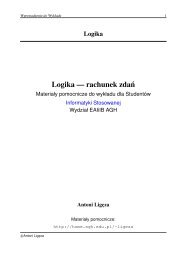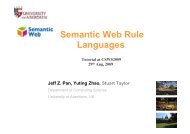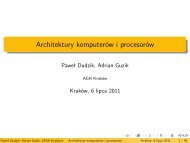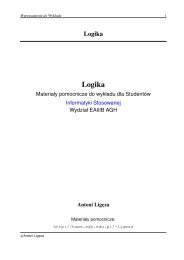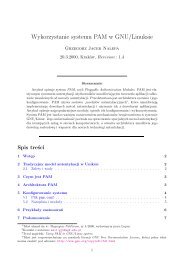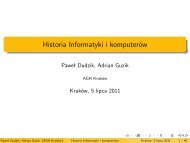An Evaluation of Knowledge Base Systems for Large OWL Datasets
An Evaluation of Knowledge Base Systems for Large OWL Datasets
An Evaluation of Knowledge Base Systems for Large OWL Datasets
You also want an ePaper? Increase the reach of your titles
YUMPU automatically turns print PDFs into web optimized ePapers that Google loves.
able, and can scale to an arbitrary size; Fourteen test queries are chosen to represent a<br />
variety <strong>of</strong> properties, including input size, selectivity, complexity, assumed hierarchy<br />
in<strong>for</strong>mation, assumed logical inference, amongst others; A set <strong>of</strong> per<strong>for</strong>mance metrics<br />
are provided, which include load time & repository size, query response time, query<br />
completeness and soundness, and a combined metric <strong>for</strong> evaluating query per<strong>for</strong>mance.<br />
LUBM is intended to be used to evaluate Semantic Web KBSs with respect to<br />
extensional queries over a large dataset that commits to a single realistic ontology.<br />
Using LUBM, we successfully conducted an evaluation <strong>of</strong> four systems, including<br />
two memory–based systems (<strong>OWL</strong>JessKB and memory-based Sesame) and two systems<br />
with persistent storage (database-based Sesame and DLDB-<strong>OWL</strong>). We tested<br />
those systems with 5 sets <strong>of</strong> benchmark data. To our knowledge, no experiment has<br />
been done with the scale <strong>of</strong> data used here. The smallest data size used consists <strong>of</strong> 15<br />
<strong>OWL</strong> files totaling 8MB, while the largest data size consists <strong>of</strong> 999 files totaling<br />
583MB.<br />
It is clear that a number <strong>of</strong> factors must be considered when evaluating a KBS.<br />
From our analysis, <strong>of</strong> the systems tested: DLDB is the best <strong>for</strong> large datasets where an<br />
equal emphasis is placed on query response time and completeness. Sesame-Memory<br />
is the best when the size is relatively small (e.g., 1 million triples) and only RDFS inference<br />
is required; while <strong>for</strong> a larger dataset (e.g., between 1 and 3 million triples),<br />
Sesame-DB may be a good alternative. <strong>OWL</strong>JessKB is the best <strong>for</strong> small datasets<br />
when <strong>OWL</strong> Lite reasoning is essential, but only after its unsoundness has been corrected.<br />
It should be pointed out that we believe that the per<strong>for</strong>mance <strong>of</strong> any given system<br />
will vary depending on the structure <strong>of</strong> the ontology and data used to evaluate it. Thus<br />
LUBM does not provide the final say on what KBS to use <strong>for</strong> an application. However,<br />
we believe that is appropriate <strong>for</strong> a large class <strong>of</strong> applications. Furthermore, the<br />
basic methodology can be used to generate ontologies and datasets <strong>for</strong> other classes <strong>of</strong><br />
applications.<br />
Acknowledgements<br />
Some <strong>of</strong> the material in this paper is based upon work supported by the<br />
Air Force Research Laboratory, Contract Number F30602-00-C-0188 and by<br />
the National Science Foundation (NSF) under Grant No. IIS-0346963. <strong>An</strong>y<br />
opinions, findings and conclusions or recommendations expressed in this<br />
material are those <strong>of</strong> the author(s) and do not necessarily reflect the<br />
views <strong>of</strong> the United States Air Force or NSF.<br />
References<br />
1. S. Alexaki, G. Karvounarakis, V. Christophides, D. Plexousakis, and K. Tolle. On Storing<br />
Voluminous RDF Description: The case <strong>of</strong> Web Portal Catalogs. In Proc. <strong>of</strong> the 4th International<br />
Workshop on the Web and Databases, 2001.



